
In a broadcast exclusive, Democracy Now! airs a recording of a recent talk by David Rubenstein, founder of the secretive defense contractor Carlyle Group. He recalls how useless Bush was as a board member of Carlyle’s firm Caterair and his surprise that George W. is now president. We also talk to Dan Briody, author of The Iron Triangle: Inside the Secret World of the Carlyle Group.
THIS IS A RUSH TRANSCRIPT
DEMOCRACY NOW:In a column posted yesterday on Salon.com, Joe Conason writes: “Preferring to avoid public scrutiny for obvious reasons, executives at the Carlyle Group usually say nothing about their firm’s connections with the Bush dynasty. But last April 23, Carlyle managing director David Rubenstein spoke quite frankly about the comfy sinecure he provided to George W. Bush more than a decade ago — and how useless Bush turned out to be. Whether he knew it or not, Rubenstein’s remarks to the Los Angeles County Employees Retirement Association were recorded.”
A copy of the tape was obtained by freelance reporter Suzan Mazur who recently posted a partial transcript on the Progressive Review website. She also supplied Democracy Now! with a copy of the tape.
Mazur notes that some within the Los Angeles County Employees Retirement Association want to pull out of investments with Carlyle which is the 11th largest defense contractor. The group has deep ties to the Bush family and the military industrial complex.
Let’s hear what Rubenstein had to say about Bush and the company Caterair International on which Bush served on the board of directors.
DAVID RUBENSTEIN:Let me talk about a bad deal. At the beginning of Carlyle–early–we didn’t have any funds. We didn’t have any dedicated funds. And we had a deal that seemed like it would be the greatest deal since sliced bread. It was handed to us. Marriott said to us, look, we’re going to sell our airline catering business.It’s number one in the world. Management team has been there for 10 years. We dominate all the markets and we’re not going to do an auction. We’re going to sell it to you guys ’cause some of our people used to work at Marriott. You know, what could be better?
So the financing was there. And we thought, this is an easy business. So they’re going to give us a company. Number one in the world. Gold plated. Got all the equipment you need. Good management team.
Well, then the Gulf War came. And all of a sudden people stopped flying… So no matter how good you think a company can be something can go wrong. We couldn’t anticipate the Gulf War. So the airline catering business has gone this way.
I mention this because it reminds us all the time we shouldn’t have hubris. You know no matter how smart we think we are or how good we are, something can go wrong. And if something seems too good in life to be true, it usually is. In this case, the only interesting thing about the deal–and we lost all our money in it. Our money and our investors’ money in it. In that deal.
But when we were putting the board together, somebody came to me and said, look there is a guy who would like to be on the board. He’s kind of down on his luck a bit. Needs a job. Needs a board position. Needs some board positions. Could you put him on the board? Pay him a salary and he’ll be a good board member and be a loyal vote for the management and so forth.
I said well we’re not usually in that business. But okay, let me meet the guy. I met the guy. I said I don’t think he adds that much value. We’ll put him on the board because–you know–we’ll do a favor for this guy; he’s done a favor for us. We put him on the board and spent three years. Came to all the meetings. Told a lot of jokes. Not that many clean ones. And after a while I kind of said to him, after about three years–you know, I’m not sure this is really for you. Maybe you should do something else. Because I don’t think you’re adding that much value to the board. You don’t know that much about the company.
He said, well I think I’m getting out of this business anyway. And I don’t really like it that much. So I’m probably going to resign from the board.
And I said, thanks–didn’t think I’d ever see him again. His name is George W. Bush. He became President of the United States. So you know if you said to me, name 25 million people who would maybe be President of the United States, he wouldn’t have been in that category. So you never know. Anyway, I haven’t been invited to the White House for any things.
AMY GOODMAN: And that was David Rubenstein, founder and managing director of the Carlyle group, an excerpt of a talk he gave to investors with the Los Angeles county retirement association who are thinking of divesting from Carlisle. Joining us on the phone right now from the hospital where his wife just had a baby, is Dan Briody, author of The Iron Triangle: Inside the Secret World of the Carlyle Group. Welcome to Democracy Now!
DAN BRIODY: Hi Amy, it’s good to be back.
AMY GOODMAN: Congratulations.
DAN BRIODY: Thank you very much
AMY GOODMAN: What did you have?
DAN BRIODY: We had a baby boy.
AMY GOODMAN: What is his name.
DAN BRIODY: Samuel David.
AMY GOODMAN: Congratulations. So, here you are in the hospital listening to David Rubenstein.You have investigated this company for years, does it surprise you?
DAN BRIODY: I’m very surprised. Normally David Rubenstein is very circumspect in the public comments that he makes. And it sounds to me as if these are the words of a man desperate to down play the company’s political connections in this case, and the advantage of those political connections in order to save an investment and save an investor from jumping ship.
JUAN GONZALEZ: And for those of our listeners and viewers who are not aware, could you talk a little bit about the senior Bush’s relationship to the Carlyle group?
DAN BRIODY: George H.W. Bush has been working for the Carlyle group as a senior advisor since 1998 and recently has gotten very, very close with the Rubenstein family. Actually the Rubensteins and Bush senior and Barbara Bush, they are very, very close friends, which has surprised some, considering that David Rubenstein himself came out of the Carter administration. He was considered a very dedicated public servant in those years and since then has moved more and more towards the conservative right over the years that he has been with Carlyle. So he maintains a very close relationship with the elder Bush and it was pretty well known that the younger Bush was a useless part of the Caterair board, the company that he was referring to in that clip.
But I’m very shocked to hear David Rubenstein actually come out and say that and also to hear him say that basically he couldn’t imagine George W. Bush ever having been president. Many of us harbor those feelings, some of us express them publicly. But I would never expect David Rubenstein to do it especially considering how closely tied his company is to the current administration. It’s very shocking.
AMY GOODMAN: Can you talk about Fred Malek, who he says came to him when they were putting the board together of the company, and said, look, there’s a guy who would like to be on the board, he’s kind of down on his luck, needs a job, needs a board position, needs some board positions, could you put him on the board.
DAN BRIODY: This is a classic kind of cronyism that we see Carlyle engaging in throughout its history. Fred Malek had a couple pans on the stove going at one time. At that point in time, he was also chairman of Northwest Airlines and bear in mind at this point George H.W. Bush was president of the United States at that time. All these things were converging at the same time Fred was doing some work for the Carlyle group. So he sort of engineered his own personal little triangle trade. He did he a favor for George W. Bush to get him on the board of Caterair after George W. Bush had had some failed business experiences in the oil industry, which you guys have talked about at length. And so he put him on the board of Caterair and in return he sort of got these favors from the administration in terms of certain F.A.A. restrictions and things like that for the airline business. Those things had nothing to do with the Carlyle group. Those were personal favors basically for Fred Malek. And so Fred was able to engineer this brilliant little triangle trade that it helped—advantaged him in the sense that it furthered his airline business and then the airline business was then able to hire Caterair to do its catering. So it all wraps up very nicely and Fred Malek of course is the former Nixon aid who was accused of counting the Jews when Nixon was afraid that the Jews in the Bureau of Labor & Statistics was undermining him, and that later came out during George H.W. Bush’s campaign for president.
JUAN GONZALEZ: Could you talk a little bit about how the Carlyle group was related to the Bin Laden family and was involved in the — and was involved in relationships with the Bin Laden family.
DAN BRIODY: The Carlyle group has had a relationship with the Bin Laden family since the mid 1990’s. They have extensive business interests in Saudi Arabia. They used to own the company called Vinell which was recently bombed in Riyadh, and was also operating as a C.I.A. cover up operation—
AMY GOODMAN: —-and has just been given the contract to—-here it goes from training basically the private militia of a despotic regime in Saudi Arabia for the last 25 years—now got the contract to train the Iraqi military.
DAN BRIODY: That’s right. This is a very controversial company. Carlyle no longer owns them. They sold them to T.R.W. a ways back and I believe T.R.W. is part of the Northrop Grumman now, but they did own them back in 1995 when there was another car bomb attack on the same company in Riyadh. So they had an extensive presence in Saudi Arabia and they wanted to increase that presence. And one of the families that they met through the royal family was the Bin laden family, which of course owns a very large construction concern in Saudi Arabia called the Saudi Bin Laden group, a $5 billion company. And that relationship proved to be very fruitful for Carlyle as the Bin Ladens became investors in some of Carlyle’s funds. And one of the most significant funds that they invested in was a fund called Carlyle Partners II which is a very large defense oriented fund that the Bin Laden family was invested in, and up until just after September 11th when it became appallingly clear to everyone that the Bin Laden family, because they were invested in this defense fund, stood to gain financially from the war on terrorism which was being waged against their own brother, Osama, so at that point the criticism in the press on Carlyle became too great and they divested themselves from the Bin Laden family.
AMY GOODMAN: And they were together on September 10, September 11.
DAN BRIODY: That’s right. The Carlyle group annual investor conference was taking place in Washington D.C. at the Ritz Carlton on the morning of September 11th, so you had all of these incredibly connected, powerful and wealthy ex-politicians, like James Baker III, like George H.W. Bush, like Frank Carluchi and the like, all together with Shafik Bin Laden looking after his family’s investment in the Carlyle group, watching the events of September 11th unfold together. Quite a scene.
AMY GOODMAN: Bush that morning, George Bush senior, flying out and caught on a plane at that time.
DAN BRIODY: That’s right.
AMY GOODMAN: Well, very interesting tape. I want to thank Suzanne Mazur for that tape. And again, interesting, the context that this was being said in, the fact that this retireees association wants to divest the Los Angeles County Employees Retirement Association wants to pull out investments from Carlyle.
DAN BRIODY: I think that’s a very encouraging sign. I think that this company has gone unscrutinized for too long. They epitomize the revolving door of Washington D.C. They are just a barrel full of conflicts of interest when you have the president’s father working for a defense-oriented firm while his son is waging war all over the world. And no one is saying anything about it. No one is calling for the resignation of this man from this company or pointing out the obvious conflict of interest here. To see a public group like this pension fund look to divest themselves. I don’t know if they actually did. But to have concerns about those things and look to divest, is a very encouraging sign that maybe people are starting to understand just how egregious of a conflict of interest this is.
AMY GOODMAN: Well, Dan Briody, thank you very much for being with us. He is the author of The Iron Triangle: Inside the Secret World of the Carlyle Group and a father as well. Congratulations.
DAN BRIODY: Thank you, Amy. Guest Info:
- David Rubenstein, founder and managing director of the Carlyle Group. This is an excerpt from a talk he gave to investors with the Los Angeles County Retirement Association on April 23, 2003.
- Dan Briody, author of The Iron Triangle: Inside the Secret World of the Carlyle Group

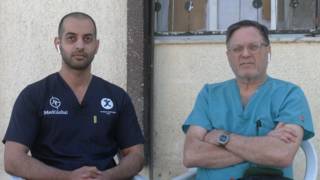
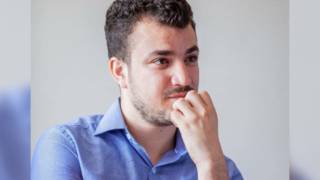
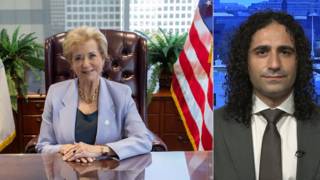
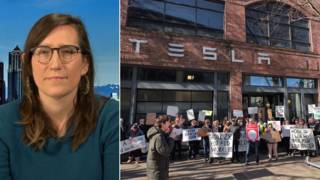





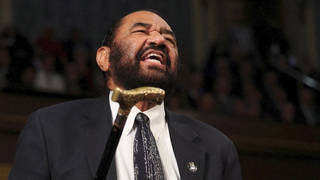
Media Options